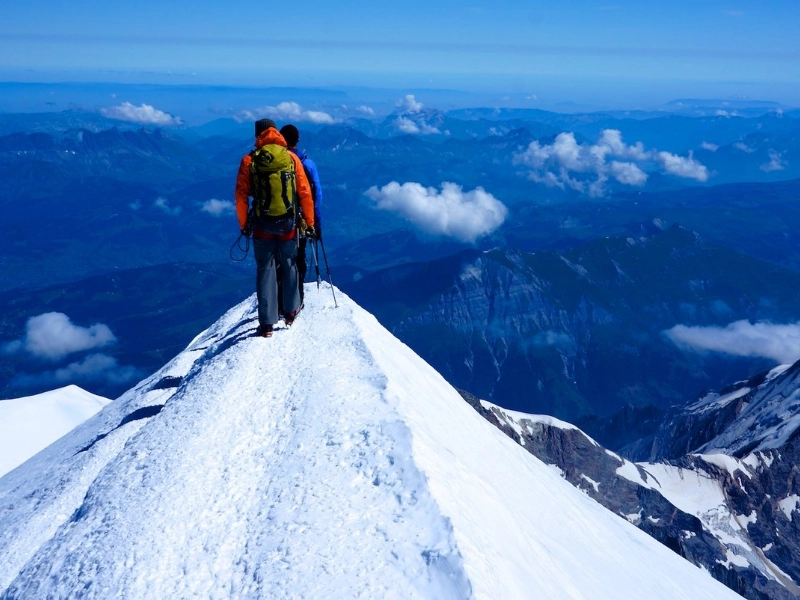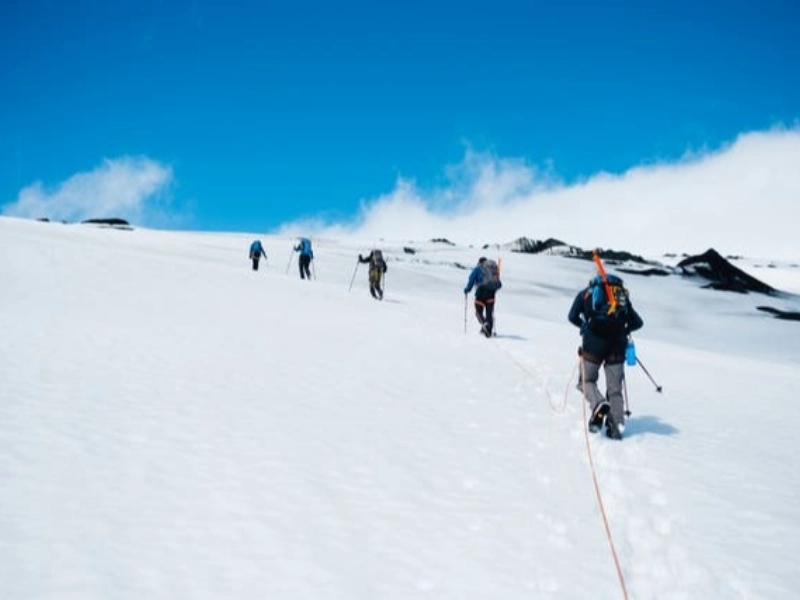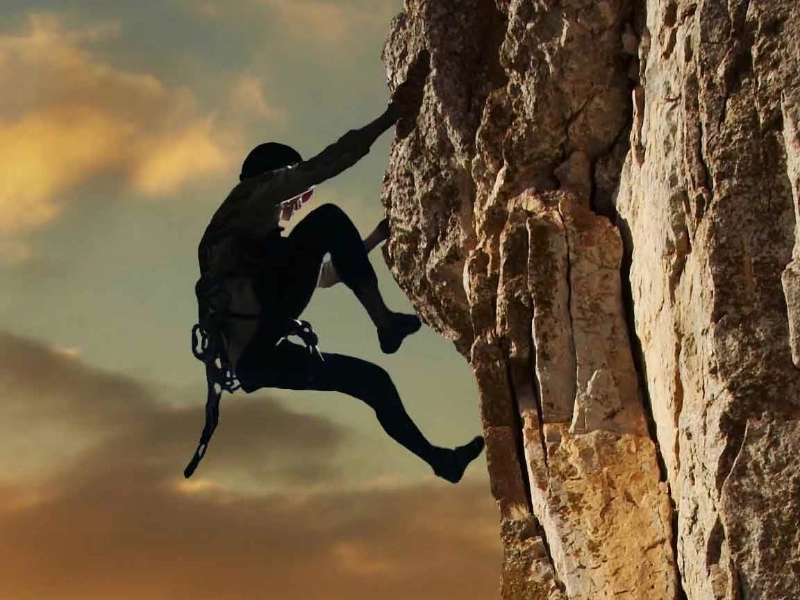Your endurance, strength, and balance, as well as your capacity to perform under pressure, are all enhanced by mountaineering. This is a physical activity that tests your limits and demands a great deal of endurance, commitment, and practice. It's crucial to get fit by hiking in terrain similar to what you'll experience on your climbs. This will assist you in acclimating to the high altitude and getting ready for consecutive long days of physical activity.
 Mountaineering is a physically demanding sport that enhances muscular strength, endurance, and balance. It raises your metabolic rate, promotes bone density, and strengthens your cardiovascular system by lowering blood pressure and blood sugar. Additionally, it promotes sound sleeping practices and generates endorphins, which reduce stress.
You need to have the strength to go great distances while carrying a hefty rucksack in order to climb a mountain. You need to strengthen your core and leg muscles in order to do this. With bodyweight exercises that use a whole range of motion and balanced movement patterns, you should concentrate on strength training.
You have to be able to adapt to an oxygen shortage in order to climb mountains. Interval training is one type of conditioning exercise that can be used to train this motor function. Give more weight-bearing and general cardio workouts less priority than activities that closely resemble the demands of your intended mountaineering activity.
Mountaineering is a physically demanding sport that enhances muscular strength, endurance, and balance. It raises your metabolic rate, promotes bone density, and strengthens your cardiovascular system by lowering blood pressure and blood sugar. Additionally, it promotes sound sleeping practices and generates endorphins, which reduce stress.
You need to have the strength to go great distances while carrying a hefty rucksack in order to climb a mountain. You need to strengthen your core and leg muscles in order to do this. With bodyweight exercises that use a whole range of motion and balanced movement patterns, you should concentrate on strength training.
You have to be able to adapt to an oxygen shortage in order to climb mountains. Interval training is one type of conditioning exercise that can be used to train this motor function. Give more weight-bearing and general cardio workouts less priority than activities that closely resemble the demands of your intended mountaineering activity.
 To stay safe when mountain climbing, one must often possess a high degree of aerobic fitness. Your heart rate and blood pressure may rise as a result of the vigorous exercise, which enhances the effectiveness of your circulatory system.
Your flexibility will increase from the sport, which can help lower your risk of injury and muscular stress. You may be able to climb harder routes with less pain and suffering if you use it.
You can discover views and landscapes that few others have seen or experienced as you advance in the sport. This elevates your spirit. The discipline of preparing for and completing a climbing goal also teaches you persistence, which is useful in other spheres of life. Furthermore, studies validate the hypothesis that physical activity enhances mental well-being through initiating new neural connections in the brain's learning region.
To stay safe when mountain climbing, one must often possess a high degree of aerobic fitness. Your heart rate and blood pressure may rise as a result of the vigorous exercise, which enhances the effectiveness of your circulatory system.
Your flexibility will increase from the sport, which can help lower your risk of injury and muscular stress. You may be able to climb harder routes with less pain and suffering if you use it.
You can discover views and landscapes that few others have seen or experienced as you advance in the sport. This elevates your spirit. The discipline of preparing for and completing a climbing goal also teaches you persistence, which is useful in other spheres of life. Furthermore, studies validate the hypothesis that physical activity enhances mental well-being through initiating new neural connections in the brain's learning region.
 Mountaineering and hiking require flexibility and awareness of your surroundings. This keeps you focused and helps you avoid getting hurt. This is a social, familial, and professional setting that can use this expertise.
Research indicates that engaging in physically demanding activities, such as climbing mountains, enhances one's capacity to focus on a task for extended periods of time. With so many distractions in today's fast-paced society, this is an invaluable talent.
Additionally, exercise raises your levels of HDL, or good cholesterol, which lowers your risk of heart disease. This is particularly valid if you climb or walk in a natural environment. Engaging in physical activity outdoors is linked to improved mental health and reduced levels of stress. Reaching the top of a mountain may be an incredibly rewarding experience that increases self-worth and a sense of accomplishment.
Mountaineering and hiking require flexibility and awareness of your surroundings. This keeps you focused and helps you avoid getting hurt. This is a social, familial, and professional setting that can use this expertise.
Research indicates that engaging in physically demanding activities, such as climbing mountains, enhances one's capacity to focus on a task for extended periods of time. With so many distractions in today's fast-paced society, this is an invaluable talent.
Additionally, exercise raises your levels of HDL, or good cholesterol, which lowers your risk of heart disease. This is particularly valid if you climb or walk in a natural environment. Engaging in physical activity outdoors is linked to improved mental health and reduced levels of stress. Reaching the top of a mountain may be an incredibly rewarding experience that increases self-worth and a sense of accomplishment.
 Climbing mountains can help you become a better team player by teaching you how to cooperate with others to accomplish a shared objective. The nature of the terrain means that climbing frequently takes longer than anticipated; therefore, the sport can also teach you to be more patient.
In order to mountaineer safely, you also learn to trust your fellow climbers. Dealing with the hazards of mountaineering, such as erratic weather, falling rocks, and concealed crevasses, requires teamwork.
Additionally, the discipline teaches you good coping mechanisms for stress and anxiety. By making your heart beat more quickly, climbing can lower blood pressure and help your body's cells receive more oxygen. It can also lower stress levels. Exercise can also promote the release of feel-good endorphins, which elevate your mood.
Climbing mountains can help you become a better team player by teaching you how to cooperate with others to accomplish a shared objective. The nature of the terrain means that climbing frequently takes longer than anticipated; therefore, the sport can also teach you to be more patient.
In order to mountaineer safely, you also learn to trust your fellow climbers. Dealing with the hazards of mountaineering, such as erratic weather, falling rocks, and concealed crevasses, requires teamwork.
Additionally, the discipline teaches you good coping mechanisms for stress and anxiety. By making your heart beat more quickly, climbing can lower blood pressure and help your body's cells receive more oxygen. It can also lower stress levels. Exercise can also promote the release of feel-good endorphins, which elevate your mood.
 Mountaineering calls for the use of specialized equipment and a high degree of persistent effort. It's not a sport appropriate for all. To stay safe, you need to be familiar with the area, comprehend mountain weather, and be proficient with rope work. In order to handle any unforeseen problems that may come up, you also need to have a lot of fitness reserves.
Notwithstanding these difficulties, mountaineering is a fantastic opportunity to meet people of all ages and form new friendships. It also aids in the development of a positive outlook that will enable you to overcome any obstacles at home or at work. According to studies, those who are optimistic are 108% more involved with life and 180% more energized at work. The abilities you acquire in the mountains will come in handy for the rest of your life.
Mountaineering calls for the use of specialized equipment and a high degree of persistent effort. It's not a sport appropriate for all. To stay safe, you need to be familiar with the area, comprehend mountain weather, and be proficient with rope work. In order to handle any unforeseen problems that may come up, you also need to have a lot of fitness reserves.
Notwithstanding these difficulties, mountaineering is a fantastic opportunity to meet people of all ages and form new friendships. It also aids in the development of a positive outlook that will enable you to overcome any obstacles at home or at work. According to studies, those who are optimistic are 108% more involved with life and 180% more energized at work. The abilities you acquire in the mountains will come in handy for the rest of your life.